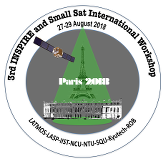Speaker
Mr
Ed Stevens
(InSpace Missions)
Description
Faraday missions are a series of spacecraft hosting technology demonstration and early service payloads in low earth orbit. The expected cadence is to launch one Faraday spacecraft every 12-18 months with Faraday-1 set for launch in June/July 2019. Faraday missions will range in size from 6U to ~100kg depending on the payloads to be manifested. The price to fly each payload depends upon the spacecraft resources required, the amount of payload data required by the customer and any special accommodation requirements. The payload will be integrated, launched and operated for 6 months, after this time extended operations are then possible on a service provision basis if required. For spacecraft above the 20kg mark Faraday will provide very flexible payload hosting opportunities using a Universal Payload Carrier (UPC) interface (developed by In-Space Missions in partnership with Magna Parva) to accommodate a number of payloads of different form factors and masses and to alter the manifest up to a short time before launch. The UPC gives a common mechanical interface method and provides power and thermal interfaces between the payload and the platform enabling payloads of up to 50kg to be hosted alongside payloads of approx. 100g.
Primary author
Mr
Ed Stevens
(InSpace Missions)

